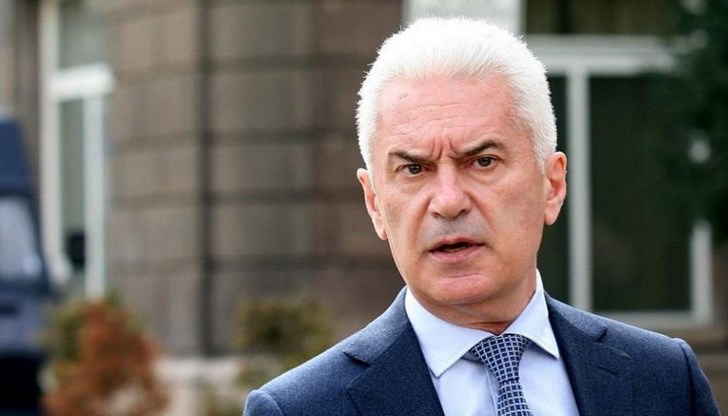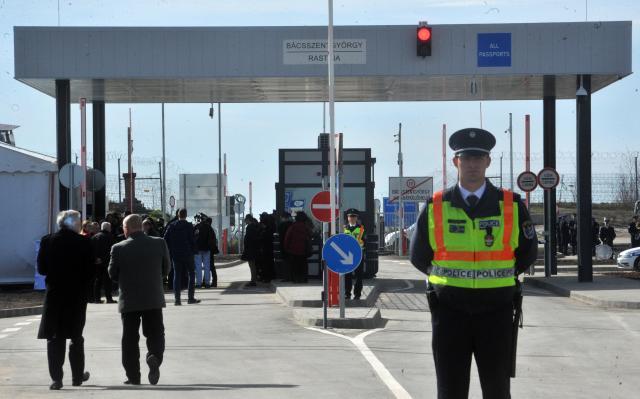Government of the Kingdom of Pravoslaviya
-

KINGDOM OF PRAVOSLAVIYA
NATIONAL GOVERNMENT
HM King Dzvinomir III
Born in 1933, the King ascended the Pravoslaviyan throne as a youngster in 1943, before being illegally dethroned by the Communist regime in 1947 and sent into exile in Angleter. He was invited back in 1992 after the fall of Communism, and returned to the throne after a referendum in 1995. The King is a member of the House of Tsetinye, which has ruled Pravoslaviya since the formation of the modern state in 1874.
Prime Minister Metodi Pravoslav

Born in 1956, Metodi Pravoslav worked as a press photographer before moving into political journalism after the fall of Communism. He launched a patriotic newspaper and was host of the popular TV show Sensational!, before volunteering to fight in an irregular unit in the patriotic war of 2001. After the war, he formed the National Movement - Purity with a group of fellow veterans, in order to ensure that Pravoslaviyan politicians never forgot the lessons of the war. The NM-P came to power in the elections of 2016, in coalition with the League Against Corruption (LPK).
In office, Metodi has ended the flow of migrant boats to Pravoslaviya, presided over economic growth, ended foreign-language instruction in Pravoslaviyan schools, launched a successful prosecution of his predecessor for corruption, and broken the back of powerful organised crime families like the Vulovich Bratstvo.
Other notable ministers
Deputy Prime Minister: Dragan Trympov (LPK)
Minister for Foreign Affairs: Bilyana Pakrats (NM-P)
Minister for Defence: Tupac Shakur (LPK)
Minister for Internal Affairs: Angel Lavrov (NM-P)
Attorney-General: Rudi Dzhulyanov (Ind) -
STATEMENT: REITZMAG
By the Prime Minister, Metodi Pravoslav
A patriotic demonstration in DzvinomirodarThe Pravoslaviyan people have for thousands of years defended their homeland against all unholy aggressors. Our sovereignty and our national identity is our proudest possession, and we are eternally vigilant to the threats of enemies without and within.
Pravoslaviya would never seek to expand our boundaries beyond our sacred Pravoslaviyan clay. We would defend our rightful land to the last man. Other nations have seen fit to pursue a different course, which we respect, provided their actions do not threaten our sovereignty, or our strategic ability to defend our sovereignty.
Our neighbour, Reitzmag, has crossed that threshold. While it irresponsibly leases its own territory and settles it with migrants from alien cultures, it seeks to recoup that loss by planting its flag in the middle of the Caspian. The Caspian is our shared heritage, and all Caspian nations share responsibility for keeping it clean, fruitful, and peaceful. Reitzmag's unilateral construction of environmentally destructive artificial islands well beyond what any reasonable nation would consider their territorial waters is an offence against all other Caspian nations.
Pravoslaviya will never recognise Reitzmag's claim to these islands. Our position has always been that they must be destroyed in an environmentally friendly manner. In negotiations conducted by former Commissioner Juncker, who I would like to thank for his efforts, it became clear that our policy is shared or accepted by both Mr Juncker and all other Caspian nations, except Reitzmag.
Disgracefully, Mr Bridges, representing Reitzmag's government, ensured the failure of these negotiations by literally stonewalling all serious proposals. These included proposals by Pravoslaviya, the United Duchies, and the European Commission. Mr Bridges' few efforts to negotiate were half-hearted and for much of the summit he sat in silence. This was an insult to all parties present and their countries or organisations, and a clear demonstration of Reitzmag's unwillingness to engage seriously on this important issue.
I would now like to propose a common-sense treaty based on what was discussed at Mr Juncker's summit. I would like to invite @North-Diessen @Copala-City @BrumBrum and @Kingdom-of-Reitzmag, as well as the new Internal Affairs Commissioner @Alkharya, to consider it and provide their feedback.
However, the lesson of the last summit is that Reitzmag will not engage unless given a clear and immediate incentive to do so. Therefore, I am announcing today that, unless the Caspian question is resolved to our satisfaction beforehand, at 00.01 GMT on March 8th, we will be introducing the following sanctions against Reitzmag:
- All borders between Pravoslaviya and Reitzmag will be closed. Reitzmic citizens without a valid and existing visa will not be able to enter or transit through Pravoslaviya.
- Reitzmic-registered vehicles, ships, or aircraft will not be permitted to travel through Pravoslaviyan territory, waters, or airspace, except for the purposes of trade between Reitzmag and Pravoslaviya. The same will go for mass transit to or from destinations in Reitzmag.
- Tariffs on Reitzmic goods entering Pravoslaviya will be doubled.
- No new Pravoslaviyan visas will be offered to Reitzmic citizens.
- The assets of Reitzmic government officials in Pravoslaviya will be frozen.
- Diplomatic relations with Reitzmag will be reduced to the lowest practicable level.
It is my desire not to implement these sanctions. I know they will lead to much hardship for some businesses in our country. But our economy exists to serve the nation; there would be no economy if there were no nation. Let this and the actions of friendly nations be a message to Reitzmag that now is the time to stop filibustering and agree terms with its neighbours.
I will also note that, after the calamitous failure of its globalist policies, Reitzmag is campaigning for diplomatic support for its sovereignty over Copala City. Let me respond by saying that, likewise, unless the Caspian question is resolved to our satisfaction, any support or solidarity from Pravoslaviya to Reitzmag is out of the question.
These are our terms:
PREAMBLE
We, the Caspian nations and the European Commission, wishing to achieve our aim to restore the Caspian political situation to its previous peaceful and friendly one, agree the following terms:
SECTION I – THE CASPIAN SEA AUTHORITY
I. The founding members of the Caspian Sea Authority will be the Kingdom of Reitzmag, the United Duchies, the Kingdom of Pravoslaviya, and the Confederacy of North Diessen.
a. The Autonomous Territory of Copala City may be admitted to the Caspian Sea Authority, either as a full member or an observer, subject to a majority vote of the Caspian Council.
b. The Caspian Sea Authority’s activities shall be funded by annual contributions from its members, set proportional to their Gross Domestic Product.
c. The Caspian Sea Authority’s budget shall be set annually by a majority vote of the Caspian Council.
d. The Caspian Sea Authority shall have a secretariat, to be located in a city to be determined by a majority vote of the Caspian Council.II. Any other sovereign state with a coastline on the Caspian Sea is entitled to become a member of the Caspian Sea Authority.
III. Every member of the Caspian Sea Authority is entitled to one vote on the Caspian Council, which shall be the governing body of the Caspian Sea Authority.
IV. The Caspian Sea Authority recognises that each member is entitled to 24 nautical miles of territorial waters from their contiguous coastline, and 200 nautical miles of Exclusive Economic Zone (EEZ).
a. Each member has within its EEZ exclusive economic rights over the exploration and exploitation of marine resources, including, but not limited to, fisheries, mining, drilling for oil or gas, and renewable energy sources.
b. Each member may sell some or all of its economic rights in its EEZ to other entities.
c. EEZs are not part of the member’s territory, and no member has the right to construct artificial islands, or conduct any business outside their proper economic rights, in their EEZ without the unanimous prior approval of the Caspian Council.V. In the event of overlapping claims to territorial waters or EEZs according to Section I, Clause IV of this agreement, the equidistance principle and the natural prolongation principle shall apply.
a. Members may decide by bilateral or multilateral treaty to amend the maritime boundaries between them.
b. In the event of any disputes between members over their maritime boundaries that cannot be resolved bilaterally, the Caspian Council shall by majority vote adjudicate on the dispute.
c. The Caspian Council will have respect to the equidistance principle and the natural prolongation principle in its adjudications on maritime boundaries.VI. The Caspian Sea Authority is responsible for oversight of the non-territorial waters of the Caspian Sea.
a. The Caspian Sea Authority shall not hinder the following activities of its members in the non-territorial waters of the Caspian Sea:
i. Trade, shipping, and commerce
ii. Public transport
iii. Border security
iv. Search and rescue
v. Routine naval exercises
b. The Caspian Sea Authority shall, by majority vote of the Caspian Council, set policies relating to fishing, mining, drilling for oil and gas, renewable energy generation, and other forms of economic activity in the non-territorial waters of the Caspian Sea that do not belong to a member’s EEZ.
c. The Caspian Sea Authority shall be responsible for air and sea traffic management in the non-territorial waters of the Caspian Sea.VII. No country may construct artificial islands beyond their territorial waters without the unanimous prior approval of the Caspian Council.
a. No offshore naval bases or permanent military installations shall be constructed in the non-territorial waters of the Caspian Sea.VIII. The Caspian Sea Authority shall, where appropriate, commission environmental impact reports to assist it in its responsibilities.
SECTION II – ISLANDS
I. The islands constructed by the Kingdom of Reitzmag in the Caspian Sea beyond its territorial waters as determined in Section I, Clause IV of this agreement (hereafter, ‘the islands’) will have their future decided by the Caspian Council.
II. In the event that an absolute majority of members do not agree on what to do with the islands, the European Commission shall destroy the islands in an environmentally friendly manner.
III. In the event the Caspian Council votes to destroy the islands, the islands must be destroyed in an environmentally friendly manner, aimed at restoring as much as possible the biosphere before construction of the islands commenced.
((OOC: Go here to comment on the draft treaty >>> https://docs.google.com/document/d/1eRsFSjtaf8c8SBQU6DV3U3FqMm31aY-ti9YY8X-T5Jg/edit?usp=sharing))
-
UPDATE: REITZMAG
Ministry for Foreign Affairs
Following agreement on the Caspian Treaty, which includes the destruction of artificial islands by the Kingdom of Reitzmag more than 24 nm out from its shoreline, all sanctions against the Kingdom of Reitzmag will be lifted as of 23.59 on April 2nd, 2021. We look forward to a constructive and positive relationship with Reitzmag and all Caspian nations.